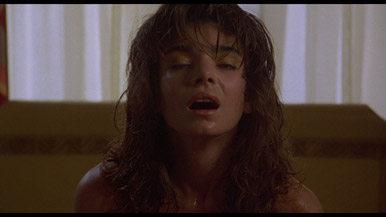Are You With Us?: Sex, Lies and Videotape
By Ryan Mazie
February 4, 2013
BoxOfficeProphets.com

There are certainly interesting scenes that consist of long takes and dialogue so natural they seem as if they could have been improvised, but as a whole, something didn’t seem to click. I think the thing missing is why we are watching a film about the characters talking (or in most cases, not talking) about sex when no one is particularly enjoying it. Imagine watching a cooking show where Rachael Ray is indifferently talking about making a meal, but never even bothers touching the ingredients.
Andie MacDowell (known for just her modeling work up to that point) stars as Ann, a woman who has never had an orgasm and just the talk of sex makes her pleasant disposition turn frigid. Her husband (Peter Gallagher) secretly heads to the bed of Ann’s sexual sister (Laura San Giacomo) to fulfill his sexual needs. The strained couple’s lives are changed when the husband’s college friend Graham (James Spader, the biggest name in the cast at the time) stays to visit while in search for an apartment. Impotent in front of others, Graham’s fetish of masturbating to his homemade videotapes of women being interviewed about sex is the source of the title.
The film builds up to an interesting conclusion, but I never found myself gripped.
Directed by Steven Soderbergh (also helming this weekend’s release of Side Effects), Sex was an important film in the indie revolution. Written in less than two weeks on a yellow legal pad by Soderbergh and shot on a shoestring budget with a fairly unknown cast, Videotape made a tidy sum at the box office, giving any young filmmaker hope to be discovered at a festival. A catalyst for making Sundance and Cannes and other festivals into bidding wars, Videotape was released by indie maestro Harvey Weinstein, who was in charge of Miramax at the time.
Released in four theaters on August 4, 1989, Videotape slowly burned up the box office, reaching 534 theaters by the last weekend of September and ultimately collecting $24.7 million ($49.5 million today). It became Miramax’s top-grosser until three years later when The Crying Game took the spot.
I was surprised to see how well the film held up. For something that started an indie revolution, the movie is fairly simple. Featuring almost exclusively the four main actors and being set in as many locations as fingers I have on my hands, the movie’s simplicity is what makes it almost classic. The rhetoric around sex never changes, making the dialogue from 1989 easily transplantable into a movie being filmed today. The only dated aspect to the film is the chunky handheld video camera and the titular videotapes (although there is something more dramatic about breaking a VHS into pieces compared to a flimsy DVD… or hitting the delete button on iMovie, if the film was made today).
Almost not even being offered an audition after Soderbergh was disappointed by performance in Greystoke: The Legend of Tarzan, Lord of the Apes (her role was infamously dubbed by Glenn Close), Andie MacDowell gives a terrifically sentimental performance. Minimal in her actions, like the film itself, MacDowell acts largely through facial expressions and uncomfortable stillness when talk of sex comes up. Although quiet in her tone and actions, MacDowell still manages to capture your attention. She hits the bullseye towards the end as an unwelcome discovery causes her character to slowly unravel.
Playing the sexpot sister against MacDowell in many scenes, Laura San Giacomo acts bigger yet complimentary (thanks to Soderbergh’s excellent directing) to her sexually quiet sister. If done wrong, Giacomo could have come off as if she had been on the set of a different movie. Instead, her abrasive conviction makes the performance work. Her monologue while being on videotape is her showcase scene. You forget the camera is slowly zooming in, thanks to Soderbergh’s sneaky work in a long, singular take.
Going against type as the peaceful protagonist, James Spader brings a certain gravitas to Graham, making his unusual fetish of videotaping women talking about sex seem almost understandable, rather than creepy. However, I had a certain level of trouble buying into his reasoning behind it (especially the reveal at the end). Listening more than talking, Spader is almost like a fly on the wall (who happens to videotape what he sees), yet still makes his presence known.
Peter Gallagher is also fine as the career-oriented husband who justifies his affair for the lack of affection his wife seems willing to give. However, his character is relatively static and his ending scene seems rather misguided (if even necessary).
Surprisingly devoid of any acting Academy Award prospects (although MacDowell and San Giacomo received Golden Globe nominations and Independent Spirit Award wins), Soderbergh snagged the film’s single Oscar nomination for his original screenplay.
A bit languorous of a set-up, the idea that conversation might be better than sex is intriguing. Winning the Palme d’Or in its debut at the Cannes Film Festival, this legendary tale of a 29-year-old director turning into a critical (and slightly commercial) success overnight might be just as interesting as the film itself. Not bringing anything new to the conversation of bedroom activities (although I do not think that it ever intended to), Sex, Lies, and Videotape thinks more with its head than its heart. While this makes way for some intelligent dialogue, it leaves a lack of warmth when it comes to the characters.
Verdict: With Us
7 out of 10